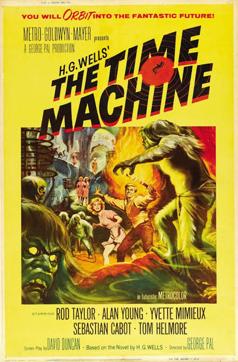Time tripping: See you yesterday... or in a thousand years from now
As a new Terminator film arrives in India next month, here’s why time travel, with its suspenseful blind corners, is such a successful trope
Last year, after the death of Stephen Hawking, perhaps the most famous physicist to have lived in recent times, there was rampant analysis of Hawking’s last big giveaway to the world of scientific curiosity. In his last book, Brief Answers to the Big Questions, Hawking claimed time travel was a realistic possibility. “Rapid space travel and travel back in time can’t be ruled out according to our present understanding,” he wrote before adding, “Science fiction fans need not lose heart.”

As the latest film in the popular Terminator franchise arrives in India next month, it is worth reminding ourselves that rather than just action, it was the concept of time travel that the first film, back in 1984, helped turn into a mainstream trope, one that has become gospel in the world of science-fiction cinema.
Time travel had been popular in science fiction around the world for centuries. Allusions to time travel are, for example, believed to even have been made in the Mahabharata. It wasn’t however, until author HG Wells’ 1895 novel, The Time Machine, that this concept came to the fore in a tangible sense – a machine.

Though some silent and black-and- white films touched upon the idea, cinema really began to explore the subject with George Pal’s The Time Machine (1960), based on Wells’ book. The same decade there was a brief allusion to time travel in the Planet of the Apes (1968). Both films, however, concerned themselves with travelling to the future. In The Terminator a cyborg from the future travels back in time to kill Sarah Connor, making it the first mainstream blockbuster to take that route.
Following the success of the first Terminator film, a number of filmmakers began using the idea, often to tell stories, or, as became the case with the Back to The Future franchise, quite simply have fun with the idea itself. Many notable films have since used time travel for plot construction. Films like Donnie Darko (2001) and The Butterfly Effect (2004) are considered cult classics, while popular sci-fi franchises like Men in Black, Star Trek, X-Men and most recently Marvel’s Avengers have also employed time travel for narrative spin. But just why do people want to watch films about time travel? Psychologists believe it is the possibility of change, the chance of undoing something in the past or the future that excites people. Predictably, most time travel films involve heroes travelling through time to either save the world or prevent a tragedy from taking place. Also, travelling to a different time makes for interesting conflicts, suspenseful blind corners and a vast fictional landscape to stretch your storytelling fingers with.
But just how plausible is time travel? Scientists have contrasting opinions. Though most agree that travel to the future is possible, considering we do it on a daily basis (we move forward in time), returning to the past might be highly improbable. Most new theories on time travel are based on Albert Einstein’s postulation of ‘Space-Time’, where time is another dimension in space and can thus be folded to create shortcuts called ‘wormholes’. Most recently, it was exhibited in celebrated director Christopher Nolan’s film Interstellar (2014).
A number of scientists believe it might eventually be possible to create a wormhole, the precise requirements of which are still in the process of being discovered. The challenge facing such scientific research is usually money and funding. That, however, isn’t a problem for the fictional world that continues to mint unspecified science for millions of dollars, as the new Terminator film might end up doing.
The Journey On The Big Screen
The Time Machine (1960), based on HG Wells’ novel, was the first major film about the concept of time travel
Back To The Future (1985) a pop culture phenomenon whose popularity continues to endure among fans even three decades later
Groundhog Day (1993), became such a cult hit that it is now a metaphor for being stuck in a cyclical loop of time
Twelve Monkeys (1995) starred heavy-weights Bruce Willis and Brad Pitt, earning the latter an Oscar nomination
About Time (2013) is a romantic film that proved that science fiction made for a good tool in other genres as well
Déjà Vu (2006) and The Edge of Tomorrow (2014) have had the likes of Denzel Washington and Tom Cruise travel through time






